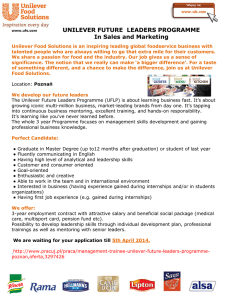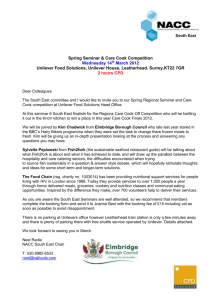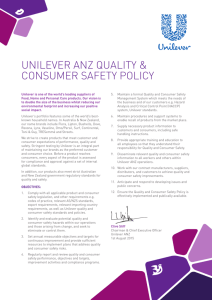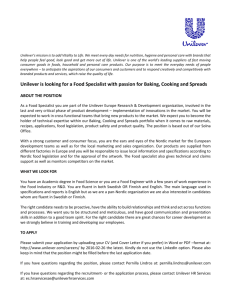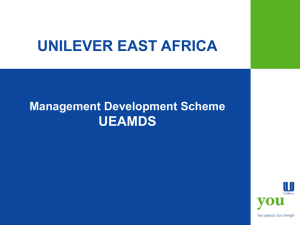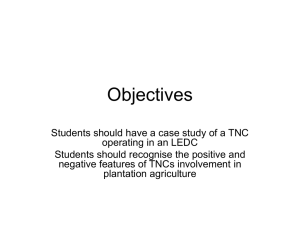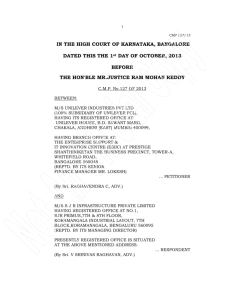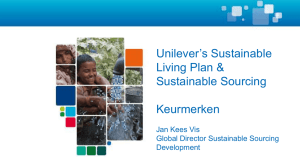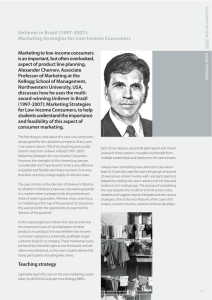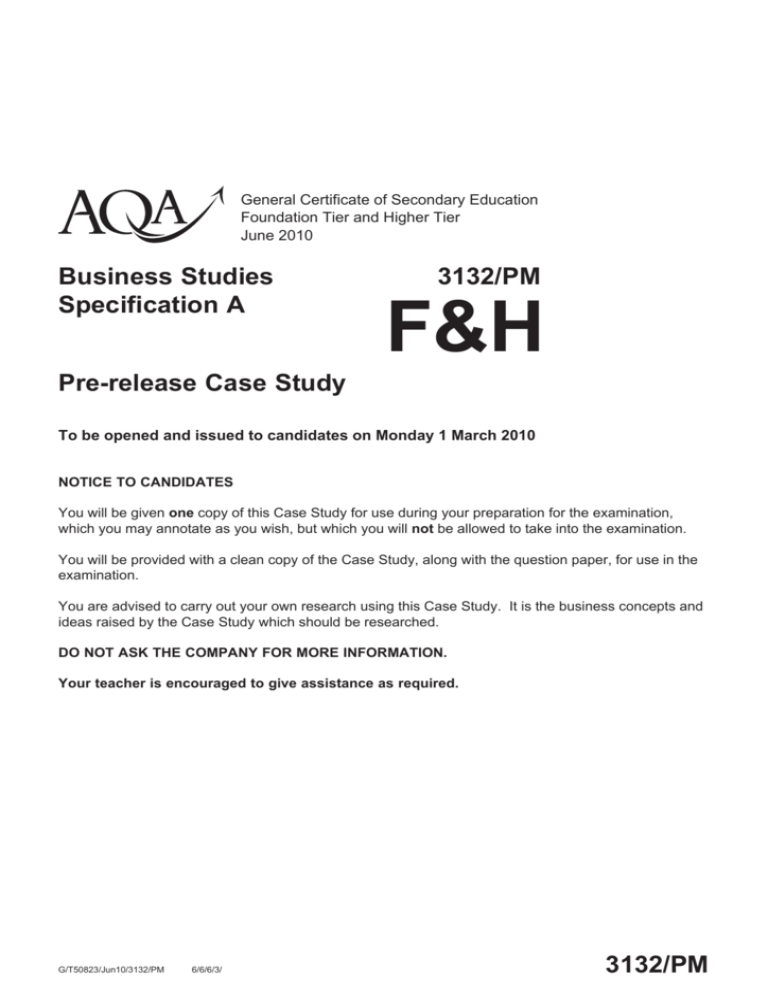
General Certificate of Secondary Education
Foundation Tier and Higher Tier
June 2010
Business Studies
Specification A
3132/PM
F&H
Pre-release Case Study
To be opened and issued to candidates on Monday 1 March 2010
NOTICE TO CANDIDATES
You will be given one copy of this Case Study for use during your preparation for the examination,
which you may annotate as you wish, but which you will not be allowed to take into the examination.
You will be provided with a clean copy of the Case Study, along with the question paper, for use in the
examination.
You are advised to carry out your own research using this Case Study. It is the business concepts and
ideas raised by the Case Study which should be researched.
DO NOT ASK THE COMPANY FOR MORE INFORMATION.
Your teacher is encouraged to give assistance as required.
G/T50823/Jun10/3132/PM
6/6/6/3/
3132/PM
2
There is no source material printed on this page
G/T50823/Jun10/3132/PM
3
Unilever
Web pages
www.unilever.co.uk
www.benjerry.co.uk
www.potnoodle.com
Source: Images, with the kind permission of Unilever
Turn over
G/T50823/Jun10/3132/PM
4
Background
Unilever is an Anglo-Dutch multinational company with headquarters in both Holland and the UK. In
Holland the company is known as Unilever NV and in Britain it is called Unilever plc.
Unilever was created in 1930 by the merger of British soap
maker, Lever Brothers, and Dutch margarine producer,
Margarine Unie. Both businesses used palm oil as a key
ingredient in their products. The two companies decided to
merge because they recognised that they could import palm
oil much more cheaply if it were bought in large quantities.
Unilever’s Mission Statement
Unilever’s mission is to add vitality
to life. We meet everyday needs
for nutrition, hygiene and personal
care with brands that help people
look good, feel good and get more
out of life.
Unilever is a conglomerate and owns many of the world’s
consumer product brands in food and drinks, cleaning
materials and personal care products. The company has
bases in more than 100 countries and sells in 150 countries. Most of Unilever’s income comes
from Fast Moving Consumer Goods (FMCG). These are relatively low priced products that are sold
quickly.
Each of these 12 Unilever Brands
have a global turnover in excess of
€1 billion
•
•
•
•
•
•
•
•
•
•
•
•
Knorr
Hellmann’s
Lipton
Flora
Blue Band
Wall’s
Omo
Surf
Dove
Lux
Rexona
Sunsilk
G/T50823/Jun10/3132/PM
Both the Dutch and UK branches of the company share
the same board of directors and operate as a single
business. The company has two share prices though,
one for Unilever NV and one for Unilever plc. Unilever
employs about 200 000 people throughout the world and
has a global turnover of more than €40 billion.
Until the 1970s, most of Unilever’s business was based
on products that contained oils and edible fats. Unilever
has diversified by buying several businesses that were
not edible oil based. By 1980, soap and edible fats
counted for far less of Unilever’s profits than was the
case in the 1960s.
5
History
In the 19th Century, general standards of hygiene in Britain were poor. People found it difficult to
keep themselves and their houses clean because, for many, soap was very expensive.
Lever & Co was started by William Hesketh Lever and
his brother, James, in 1884. Their father ran a grocery
business which sold soap, as well as many other items.
Soap in those days was sold in long bars that had to be
cut into smaller pieces when the customer got home.
William recognised that he could add value by offering
bars of cut, wrapped and branded soap in his father’s
grocery shop.
The two brothers took over a small soap works in
Warrington, Cheshire. The business manufactured
Sunlight Soap, which was made with vegetable oils
rather than animal fats.
Early Packaging of Sunlight Soap
The business outgrew the Warrington factory and Lever & Co moved to larger premises. A factory
together with a workers’ village was built on reclaimed marshland by the River Mersey. The area
became known as Port Sunlight. The location was thought to be suitable as it was next to the river,
which allowed ships to get close to the factory.
In 1890, the business became known as Lever Brothers Ltd.
Lever Brothers quickly established a good reputation for being an ethical business. The company set
up projects to improve the lives of its workers and created products that benefited society. Soap and
other cleaning materials made by Lever Brothers also improved hygiene.
By 1911, the company had established its own palm plantations in West Africa and the Solomon
Islands. Lever Brothers also acquired other soap companies, including A&F Pears.
Turn over
G/T50823/Jun10/3132/PM
6
Marketing
Unilever currently owns about 400 brands, which can be split up into four categories:
•
•
•
•
Savoury, dressings and spreads
Ice cream and beverages
Personal care
Home care.
Unilever uses television extensively to promote its products and to
reinforce its brands. It also uses sponsorship, both to advertise its
name and to set out its core ethical values.
Unilever’s major
competitors include
•
•
•
•
•
Procter & Gamble
Nestlé
Kraft Foods
Mars Incorporated
Reckitt Benckiser
Heartbrands
The Heartbrand Logo
G/T50823/Jun10/3132/PM
Unilever is the world’s biggest ice cream manufacturer with an
annual turnover of more than €5 billion. Most of its brands are
sold using the Heartbrand logo. The distinctive double heart was
launched in 1999 (and slightly modified in 2002) in order to increase
international brand awareness. Although the logo is common
worldwide, each country retained the local brand so that customers
would be familiar with the product. In the UK, Unilever kept the
Wall’s brand.
7
Two Examples of Unilever’s Brands
Pot Noodles
Instant snacks, Pot Noodles, were introduced to UK
consumers in 1977. The product is targeted in particular
at the young male market, using humorous and
sometimes controversial advertising.
The product has developed since its introduction. New
flavours have been added and salt content reduced to
make the snack healthier.
In 2008, Unilever announced that it intended to close the factory at Crumlin in South Wales, where
Pot Noodles are made. Following negotiations with unions, however, Unilever decided to keep the
plant open and to invest £1 million in automated machinery.
Ben & Jerry’s
Ben & Jerry’s is a popular ice-cream brand at the luxury end of the
market. The business was bought by Unilever in 2000. Unilever has
chosen not to sell Ben & Jerry’s ice cream using the Heartbrand logo.
Ben Cohen and Jerry Greenfield created the business in 1978 after
they had learned to make ice cream by taking a correspondence
course. The two partners decided to franchise the brand in 1981,
allowing other businesses to use its name. In 1995, Ben & Jerry’s
expanded to Europe, followed by Japan in 1998.
Ben & Jerry’s ice cream is made using batch production methods.
The unflavoured ice cream is made in 5000 litre containers. The ice
cream is then moved to 2500 litre containers where the flavours are
added. The equipment is then cleaned for another batch to be produced.
Turn over
G/T50823/Jun10/3132/PM
8
Stakeholders
Unilever says that it has been involved in a growing number of projects to obtain its raw materials
from sustainable sources. Unilever also believes that it has a responsibility to support the local
communities in which it operates.
Local communities
In 2007, Unilever contributed €89 million to local communities in the form of cash contributions and
other support. This helped fund more than 14 000 community projects around the world. About
two-thirds of this funding went on long-term community investments. The rest was given as charitable
donations in response to urgent local social needs.
Employees
When Lever Brothers moved its soap making business to Port Sunlight, it built good quality housing
for its employees. Unilever states that it continues to take an interest in its employees. The company
is concerned that its workforce represents the communities in which it is based. Having a diverse set
of employees, Unilever says, helps the company to understand its customers. Unilever has a policy
of giving fair consideration to all job applicants regardless of such things as gender, nationality, race,
creed and disability.
Unilever ensures that its employees are trained to do their jobs safely
and efficiently. The company also tries to ensure that its employees
enjoy a healthy work/life balance.
Unilever has recently decided to outsource some of the work of its
human resource department to another organisation.
G/T50823/Jun10/3132/PM
Outsourcing
Using another company
to take responsibility
for certain aspects of a
business.
9
Ethical Business Practice
Unilever states that it measures its success by acting with ‘the highest standards of corporate
behaviour towards our employees, consumers and the societies and world in which we live’.
Unilever has tried to
behave in an ethical
manner. From 1996 to
2009, Flora sponsored
the London Marathon.
Unilever has promoted
the use of free-range
eggs in its Hellmann’s
products. The company
ensures that it pays a fair
price for the tea it buys for its PG Tips brand. Dove Soap
has also tried to raise the self-esteem of women with its
Campaign for Real Beauty.
Dove’s Campaign for Real Beauty
Palm oil is still an important ingredient in some of Unilever’s products. Palms are grown in Asia,
Africa and Central America, in some of the poorest rural areas of the world. Many people rely on
growing palms and extracting its oil for their incomes. Money made from selling palm oil is also used
to regenerate some of the poor areas in which it grows. For example, funds made from palm oil were
used to pay for a hospital in Sierra Leone, in West Africa.
The demand for palm oil has expanded in recent years. Some of this increase is due to the growth
in the economies of India and China. Palm oil is also being increasingly used as an ingredient in
livestock feed and for biofuels.
Palm oil production has an environmental
impact. Environmental pressure groups, such
as Greenpeace, point out that tropical rainforests
are being destroyed to make way for palm
plantations. Animal habitats are being destroyed
as a result of deforestation.
Unilever says that not all of its products use
palm oil. It points out that the company has
a long history of promoting sustainability of
resources, particularly with tea and fish. It also
states that it is leading the search to find ways of
making palm oil production sustainable.
Environmentalists protesting outside
Unilever’s headquarters
Source: Copyright Guardian News & Media Ltd 2008
Economic Factors
Unilever operates in many countries. The company accounts are given in euros, so costs, revenues
and profits need to be converted into this currency. Unilever’s profits are affected by changes in
exchange rates.
The global recession and credit crunch, that started in 2008, meant that many businesses had to find
ways of maintaining demand for their goods. Many jobs have been lost as businesses attempt to
reduce their costs.
Turn over
G/T50823/Jun10/3132/PM
10
Finance
Unilever publishes its accounts in euros.
Table 1
Details of Unilever’s finances extracted from the Company Accounts.
All figures are € million.
2008
2007
2006
Turnover
Cost of Sales
Net Profit
40 523
21 342
5 285
40 187
20 558
4 136
39 642
20 093
5 015
Non Current Assets (Fixed Assets)
Current Assets
Current Liabilities
Total Capital Employed
24 967
11 175
13 800
22 342
27 374
9 928
13 559
23 743
27 571
9 501
13 884
23 188
Breakdown of turnover and profits by region: Western Europe, Americas and Asia/Africa
Chart 1
Unilever: Turnover by Region
15 000
14 000
13 000
12 000
Turnover:
€ million 11 000
10 000
9 000
8 000
7 000
6 000
2008
Key:
G/T50823/Jun10/3132/PM
2006
2007
Western Europe
Americas
Asia/Africa
11
Chart 2
Unilever: Operating Profit by Region
3000
2800
2600
2400
Operating 2200
Profit:
€ million 2000
1800
1600
1400
1200
2008
Key:
2006
2007
Western Europe
Americas
Asia/Africa
Issues for the Future
• Unilever has to make a profit in order to keep its shareholders happy. It also wishes to maintain
its ethical reputation for which it is known.
• Consumers are becoming concerned about the environmental effects of continuing to produce
large amounts of palm oil. However, palm oil production generates incomes in some of the
poorest areas of the world.
• As a multinational company, Unilever is influenced by exchange rates. This is a particular concern
as the business has headquarters in two countries that do not share the same currency.
• The world has recently experienced a global recession. Keeping the business profitable without
having to make large numbers of employees redundant is a concern.
END OF CASE STUDY
G/T50823/Jun10/3132/PM
12
There is no source material printed on this page
Copyright © 2010 AQA and its licensors. All rights reserved.
G/T50823/Jun10/3132/PM

